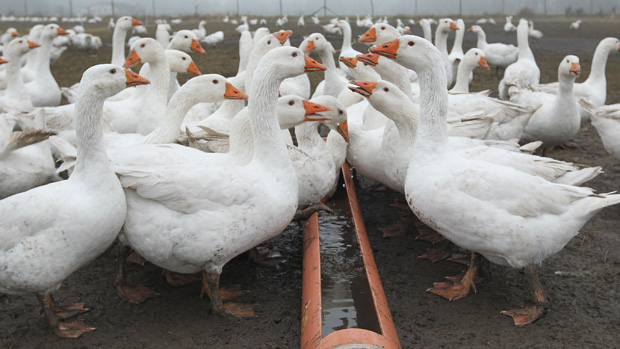Foie gras: is it acceptable to eat liver from a force-fed bird?
The expensive delicacy, described as the 'Abu Ghraib of poultry dishes', at centre of legal battle in France

A free daily email with the biggest news stories of the day – and the best features from TheWeek.com
You are now subscribed
Your newsletter sign-up was successful
The verdict in a landmark case about foie gras is due to be delivered tomorrow in France, potentially paving the way for further prosecutions against producers of the controversial dish.
Animal rights group L214 is privately prosecuting foie gras producer Ernest Soulard for "extreme cruelty" against animals, the first case of its kind in the country.
L214 published a video in 2013, which it said showed distressed and wounded geese being force-fed and confined in individual cages. The company's management, which could face a fine and prison sentence if found guilty, had claimed the pictures were fake and misleading. It has since called for the case to be dropped due to lack of evidence.
The Week
Escape your echo chamber. Get the facts behind the news, plus analysis from multiple perspectives.

Sign up for The Week's Free Newsletters
From our morning news briefing to a weekly Good News Newsletter, get the best of The Week delivered directly to your inbox.
From our morning news briefing to a weekly Good News Newsletter, get the best of The Week delivered directly to your inbox.
The trial has highlighted once again the controversy that surrounds the production of foie gras, which under French law is defined as the liver of a duck or goose fattened by the force-feeding of corn through a feeding tube.
In the UK and several other European countries, it is illegal to produce foie gras, but it can still be traded and sold from elsewhere.
Animal charities argue that force-feeding distresses the birds, that the feeding pipe can damage their throats and that their livers can become six to ten times their normal size.
Gawker's Hamilton Nolan is among critics who view the production of the dish as "torture". In a post entitled "Foie Gras Is For Assholes", he describes it as the "Abu Ghraib of poultry dishes" and urges "foodies" to eat something else.
A free daily email with the biggest news stories of the day – and the best features from TheWeek.com
"There is no amount of tastiness that outweighs the act of torture," he says. "The fact that you 'like' something that involves torture is not an absolution."
Other critics point to a 1998 EU review of studies on animal welfare, which concluded that "force feeding, as currently practised, is detrimental to the welfare of the birds".
But supporters of the dish claim that conditions for birds are improving.
The Guardian says there is "at least one producer who doesn't create his foie gras by force", while other farms have also rejected cages, but still use a feeding pipe.
J Kenji López-Alt, managing culinary director of Serious Eats, who visited La Belle Farm, one of only three foie gras producers in the United States, said he was surprised by the conditions. Birds were free to roam as they pleased in an enormous shed and they "certainly didn't seem stressed", he said.
"To single out foie as the worst of the worst is misguided at best, and downright manipulative at worst," said López-Alt. "Just as there are good eggs and bad eggs, good beef and bad beef, good chicken and bad chicken, so there is good foie and bad foie."
He also claimed that the physiology of birds is very different to humans, meaning that their oesophagi are "custom-built for stretching".
Critics argue that free-range farms are not the norm. The RSPCA says "most ducks (around 80 per cent) are kept individually in small, wire or plastic cages with their head placed through an opening in the front, so the neck is easy to grasp".
Nevertheless, some foie gras supporters think there are more important issues to worry about. Restaurant critic AA Gill has previously argued we should show more concern for the welfare of people who work in kitchens across the world than "what a duck had for tea". He added: "I also don't really care if animals suffer. If I'm perfectly honest, I don't give a shit."